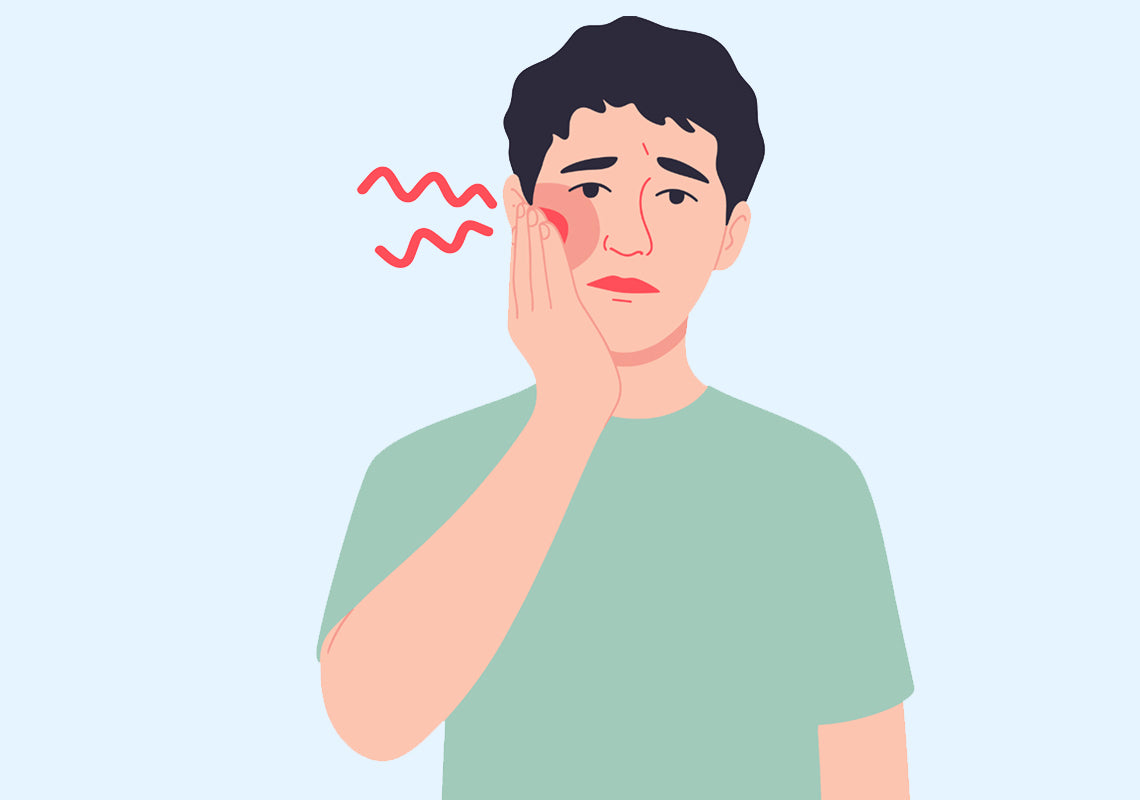Key Takeaways:
Toothaches can signal underlying dental issues and should not be ignored.
Home remedies like saltwater rinses, cold compresses, and clove oil can provide temporary pain relief.
Over-the-counter pain relievers like ibuprofen or acetaminophen offer quick, short-term comfort.
Natural options like garlic paste and peppermint tea bags can help soothe discomfort.
Hydrogen peroxide rinses must be diluted before use to avoid harm.
These remedies are temporary solutions and do not treat the root cause of the problem.
Seek professional dental care if pain persists, swelling occurs, or signs of infection are present.
Early treatment can prevent complications and protect overall oral health.
Table of Content
-
Why toothaches happen: Understanding the pain
-
The role of home remedies
-
Saltwater rinse: The simplest, most reliable remedy
-
Cold compress: Numb the pain, reduce swelling
-
Over-the-counter pain relief
-
Clove oil: A natural numbing agent
-
Garlic: Small but mighty
-
Peppermint tea bags: Gentle and soothing
-
Hydrogen peroxide rinse (but use it carefully)
-
When home remedies help: And when they don't
-
The dangers of ignoring a toothache
-
When to see a dentist urgently
-
Preventing future toothaches
-
FAQs
Why toothaches happen: Understanding the pain
A toothache doesn't just come out of nowhere. It's usually the result of something specific happening in your mouth, and sometimes even beyond it.
Here are the most common culprits behind dental pain:
-
Tooth decay (cavities): When bacteria erode your enamel, they eventually reach the sensitive inner layers of the tooth, causing pain.
-
Gum disease: Inflammation and infection of the gums can lead to tenderness, throbbing, and bleeding.
-
Cracked or broken teeth: Even a tiny crack can expose nerves and cause intense sensitivity.
-
Abscesses: A serious infection at the root of the tooth that causes deep, persistent pain and swelling.
-
Impacted wisdom teeth: When these teeth don't have enough room to grow, they can cause pain and pressure.
-
Sinus issues: Believe it or not, sinus infections can sometimes cause upper tooth pain by creating pressure in the jaw.
-
Clenching or grinding (Bruxism): Many people clench or grind their teeth, often while asleep, without realizing it. Over time, this constant pressure wears down enamel, strains the jaw, and leads to persistent toothache or sensitivity.
Recognising your pain pattern
The type of pain you're feeling can help you figure out what's happening.
-
Sharp, stabbing pain when you bite down? That might be a cracked tooth, and you'll need to experience tooth pain when biting down until you can see a dentist.
-
A dull, continuous throb paired with swelling? That could be an abscess, which is a dental emergency.
-
Constant aching or soreness in your jaw, especially when you wake up? Clenching or grinding may be the cause.
Night Guards: Protect Your Teeth While You Sleep

If clenching or grinding is behind your toothache, a night guard could be a game-changer. These custom-fit mouthpieces act as a protective barrier, reducing the pressure on your teeth and preventing further damage.
At Caspersmile, we offer high-quality, comfortable night guards designed to fit perfectly and help you sleep peacefully while protecting your smile. They're easy to use, discreet, and professionally made to last.
“Bruxism is the involuntary grinding or clenching of teeth, often during sleep. It can cause tooth wear, headaches, and jaw pain if untreated. Night guards, stress relief techniques, and dental adjustments are common treatments.”
Don't wait until the pain gets worse.
Take the first step towards waking up pain-free and protecting your teeth for the long term.

The role of home remedies
Before we dive into specific remedies, let's get one thing straight: home remedies for toothache are temporary measures, not cures.
Think of them like putting a plaster on a deep cut; they'll help manage discomfort, but they won't solve the underlying issue.
Home remedies work best when:
-
You have mild irritation or inflammation.
-
You're waiting for a dental appointment.
-
You need to control pain long enough to sleep or get through your day.
They are not a substitute for professional care. In fact, using home remedies for too long can mask symptoms while the actual problem gets worse.
Saltwater rinse: The simplest, most reliable remedy

If you are wondering how to relieve gum pain? One of the oldest and most trusted toothache remedies is also the easiest: a saltwater rinse.
Why it works:
Saltwater acts as a natural disinfectant. It reduces inflammation, soothes gums, and helps dislodge food particles or debris stuck between teeth.
How to make a proper rinse:
-
Mix ½ teaspoon of salt with a glass of warm water.
-
Swish it around your mouth for 30 seconds.
-
Spit it out, don't swallow.
-
Repeat a few times a day as needed.
This simple remedy is safe, effective, and costs next to nothing. It's especially helpful if your pain is related to gum inflammation or irritation.
Cold compress: Numb the pain, reduce swelling

If your toothache is accompanied by swelling or facial pain, a cold compress can bring significant relief.
What to do:
-
Wrap ice cubes or a frozen pack in a thin cloth.
-
Hold it against the affected area for 15-20 minutes.
-
Take a break for another 20 minutes, then repeat if needed.
Cold therapy constricts blood vessels, reducing inflammation and numbing sharp pain. It's a must-try for anyone wondering how to stop tooth pain fast at home at night, especially after a dental injury.
Over-the-counter pain relief

When natural remedies aren't enough, over-the-counter pain relievers like ibuprofen or acetaminophen can be your best friend.
-
Ibuprofen is particularly useful because it not only relieves pain but also fights inflammation.
-
Acetaminophen is another safe option, especially if you can't take anti-inflammatory medications.
These are considered some of the strongest toothache medicines available without a prescription.
Important note: Always follow the dosage instructions carefully, and never place aspirin directly on your tooth or gums. It can burn your soft tissue and make things worse.
Clove oil: A natural numbing agent

Clove oil has been used for centuries as a natural remedy for toothaches. Its secret weapon is eugenol, a compound with strong pain-relieving and antibacterial properties.
Here's how to use it safely:
-
Soak a cotton ball in a few drops of clove oil.
-
Apply it directly to the sore tooth or gum area.
-
Leave it for a few minutes and let the numbing effect kick in.
The taste is quite strong, but this is one of the most effective options when you need what helps with toothache naturally.
Garlic: Small but mighty

Garlic isn't just for flavouring curries or pasta. It has powerful antibacterial properties that can help fight the bacteria causing your toothache.
Quick remedy:
-
Crush one garlic clove to make a paste.
-
Apply the paste directly to the affected area for a few minutes.
-
Rinse your mouth thoroughly afterward.
Yes, your breath won't smell amazing, but it's worth it when you need natural pain relief in a pinch.
Peppermint tea bags: Gentle and soothing

If clove oil or garlic feels a bit too intense, peppermint tea bags offer a milder, more soothing alternative.
How it works:
-
Brew a peppermint tea bag, then let it cool down.
-
Place the cooled bag on the affected area for a gentle numbing effect.
This method won't provide as strong relief as clove oil, but it's perfect for sensitive mouths or mild discomfort.
Hydrogen peroxide rinse (but use it carefully)

Hydrogen peroxide is another effective antibacterial rinse, but it must be diluted to avoid irritation or harm.
Safe ratio:
Mix equal parts hydrogen peroxide and water. Swish gently for 30 seconds, then spit out — never swallow.
This rinse helps reduce bacteria and plaque while soothing minor gum inflammation. However, overuse can damage soft tissue, so use sparingly and only as a temporary measure.
Home remedies at a glance
Here's a quick reference table for the most common toothache remedies:
|
Remedy |
How it helps |
Best for |
|
Saltwater rinse |
Cleans mouth, reduces swelling |
Gum irritation, stuck food |
|
Cold compress |
Numbs pain, lowers inflammation |
Injury, swelling |
|
Clove oil |
Natural pain relief, antiseptic |
Localised tooth pain |
|
Garlic |
Kills bacteria, eases discomfort |
Bacterial issues |
|
Peppermint tea bag |
Mild numbing, soothing effect |
Sensitive mouths, light pain |
|
Hydrogen peroxide rinse |
Reduces bacteria and plaque control |
Gum problems, mild inflammation |
When home remedies help: And when they don't
Home remedies are brilliant for temporary relief.
They're perfect when you:
-
Have a bit of gum irritation.
-
Bit your cheek or lip and need quick soothing.
-
You are waiting for your dental appointment.
-
Need a few hours of pain control to sleep or get through a busy day.
But here's the catch: they don't fix the underlying cause. You can rinse, numb, and soothe all you want, but if you've got a cavity, infection, or abscess, it will only get worse over time.
The dangers of ignoring a toothache
Some people try to “tough it out,” especially if the pain comes and goes.
Here's why that's a bad idea:
-
Infections spread fast: A tooth abscess can spread to your jaw, sinuses, and even your bloodstream if untreated.
-
Small cavities grow: A tiny spot of decay today could mean a root canal tomorrow.
-
Chronic pain wears you down: Lack of sleep and constant discomfort affect your overall health and mood.
By waiting too long, you risk turning a simple filling into a major, costly procedure.
When to see a dentist urgently
If you notice any of these signs, don't delay, book an appointment with your local dentist immediately:
-
Pain that lasts longer than 1-2 days.
-
Swelling in your face or jaw.
-
Signs of infection, like fever, pus, or spreading pain.
-
A broken, cracked, or knocked-out tooth.
Preventing future toothaches
While no one can completely avoid dental problems, there's a lot you can do to reduce your risk:
-
Brush twice daily with a fluoride toothpaste.
-
Floss or use interdental brushes to remove plaque between teeth.
-
Avoid too many sugary foods and drinks.
-
Visit your dentist regularly for check-ups and cleanings.
-
Address small issues, like sensitivity, before they escalate.
Pro Tip
Many of these habits can also help reduce your braces pain while keeping your teeth healthy and strong.
Toothache: Prevention and remedies
A toothache may be manageable at first, but it's hardly without risk. Sure, home remedies for toothaches can help a bit. A saltwater rinse here, a little clove oil there, they can help you get by until you see your dental professional. Pain is your body's way of saying, "Hey, something isn't right." Listen to it.
Make that appointment, take care of your mouth, and don't let something small become something very large.
If you're experiencing dental pain right now, Caspersmile is here to help you return to smiling, eating, and living without that constant ache in your jaws. Because you deserve a smile that looks great and feels great.
Frequently asked questions

Citations
Seed, S. (2024, March 24). Toothache relief and home remedies. WebMD.
https://www.webmd.com/oral-health/home-remedies-toothache
Cronkleton, E. (2025, April 23). 11 home and natural remedies for toothache pain. Healthline.
https://www.healthline.com/health/dental-and-oral-health/home-remedies-for-toothache
Toothache. (2025, September 11). Cleveland Clinic.
https://my.clevelandclinic.org/health/diseases/10957-toothache
Ponsford, S. (2024, April 23). What is a toothache, and how to find relief.
https://www.medicalnewstoday.com/articles/320315
Subscribe our newsletter
By clicking subscribe, you agree to our Privacy Policy and opt in to receive communications from Caspersmile. You can unsubscribe at any time.







